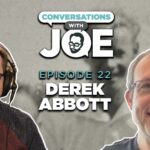Scientists Have Discovered The Largest Structure In The Universe
In today’s Lightning Round video, I answer questions from Patreon supporters on topics such as the Giant Arc – possibly the largest structure ever discovered in the universe, how autonomous cars will change industries, geopolitical instability, and whether phones can actually disrupt commercial aircraft.
TRANSCRIPT:
It’s almost Christmas, so it’s time for Christmas lights-ning round.
And because it’s the 6th day of Christmas, I’ve got 6 geese a-layin’, meaning 6 questions. Because geese are very inquisitive animals and they’re laying questions…
Nothing about this analogy works. I’m not even sure if it’s the 6th day; where do you start counting from?
Apparently all of the different “gifts” in the song represent something and the partridge in a pear tree is supposed to mean they’re having an affair? That’s what my wife told me anyway. It’s all very weird, I’m sure the Victorians came up with it.
It’s probably all just hallucinations from arsenic and lead poisoning washed down with cocaine wine.
Anyway… Let’s get to the questions!
Like always these Lightning Round questions were gathered from Patreon supporters who are supporting at the solar system level so big thanks to them for the support as well as the questions.
Robin Tennant Colburn
Do cell phones really interfere with commercial airplane cockpit equipment?
Seems pretty hard to believe they don’t confiscate phones if it is true or wouldn’t a lot of planes have come down?–I think this falls into the category of “An Abundance of Caution”
According to pilot and author of Cockpit Confidential, Patrick Smith, ““Can cellular communications really disrupt cockpit equipment? The answer is potentially yes, but in all likelihood no,”“Even if it is not actively engaged with a call, a powered phone dispatches bursts of energy that can, in theory, interfere with a plane’s electronics. Aircraft are designed and shielded with this interference in mind, however, and this should mitigate any ill effects.”
So airplane mode is just an extra layer of protection when the plane is in the air, but it’s on takeoff and landing that it’s the most important, this is when most airplane incidents occur.
This is when it’s most important for pilots to communicate clearly with the tower and really, this is the only time the pilots actually do any flying, the rest is just done on autopilot with the pilots there to keep watch and make sure everything’s working correctly.
It’s the same reason they want you to put away large electronic devices at takeoff and landing, should something go wrong, you don’t want those flying around. It’s very unlikely to be necessary, but it can’t hurt to be cautious.
I for one don’t care. It’s a tiny price to pay. Commercial plane crashes are down to almost nothing, thanks to this overabundance of caution, so I’m kinda fine with that. Flying is a modern miracle. Smartphones are a modern miracle. Must we have both at the same time?
Also this:
Plus, as Business Insider notes, the sheer effort of hundreds of in-flight cell phones attempting to connect to on-the-ground towers can put a major strain on cellular networks.
On the ground, your phone connects to one cell tower at a time (the closest one to you), switching to a new one as you move. But, as Travel + Leisure reports, when you’re far from the towers at 10,000 feet in the air traveling at hundreds of miles an hour, your phone connects to multiple towers at once.
That congestion can potentially make it more difficult for people on the ground to connect.
Cole Parker
While one might debate the when, the if of self driving cars seems settled. When level-4 unoccupied driving becomes available what business and services types are the most effected? Taxis seems obvious but what about parking lots or gas stations?
Gas stations I assume would be more affected by electrification than autonomy What even is a gas station anymore? Isn’t it all convenience stores with self-service gas pumps (except in some places) Because drivers will no longer be pumping gas themselves, gas stations won’t be needed at major intersections and fueling and recharging will likely take a place in out of the way locations where real estate is less expensive. However, some observers believe the spread of AVs could be boon for convenience stores as long-distance trips will become more popular and replace air travel. Even if the nature of filling stations change, passengers will still need to stop to use the bathroom or to get something to eat or drink, so it remains to be seen if business at roadside convenience stores could increase. Insurance companies Warren Buffet: Buffett told CNBC, “If they’re safer, there’s less in the way of insurance costs, [and] that brings down premiums significantly.”
Trucking/logistics Hauling more goods for less money could lower prices on everything. long-haul trucking will become more efficient which could put pressure on railroads;
Ridesharing
Beyond these five, many other industries will be affected. For example, the need for parking spaces will be gradually relieved, which will also affect the way real estate is used; more cellular data and entertainment services like Netflix will be consumed during car trips; package and food delivery will become more efficient and cheaper, accelerating the growth of restaurant delivery and e-commerce; driving schools will become obsolete;
Brian Beswick
Can you talk about The Great Arc?
Is the Cosmological Principle dead?
This was interesting, I wasn’t aware of this one.
So the Giant Arc was discovered thanks to the Sloan Digital Sky Survey, so let’s start with that.
The Sloan Digital Sky Survey, or SDSS, is a 2.5m wide optical telescope that conducts multi-spectral imaging and red-shift surveying. It’s based out of Apache Point Observatory in New Mexico.
It’s been through many iterations over the years but first started operating in 1999 and its job is to survey as much of the sky as possible.
Like most telescopes zoom in on a tiny point in the sky or a single star or there’s that famous Hubble Deep Field photo where they pointed it at a tiny patch of sky and found all these galaxies, this is the opposite of that.
This telescope wants to capture the entire sky every night and just chug away collecting massive amounts of data, like it collects 200 gigs of data every night.
Anyway, all of this data is made available for astronomers to use and cosmologist Alexia Lopez found what might be the largest structure in the universe.(Alexia Lopez, University of Central Lancashire in Preston, England)
It looks like this, and they’re calling it the Giant Arc. So, just to explain what you’re looking at here, all the little blue dots are quasars, basically primordial black holes which I’ve talked about in a previous video but they’re super old and therefore really, really far away. And the gray blobs are galaxy clusters in between the quasars and us. And what Lopez and her team were looking for were specific signatures of light coming off of those quasars that would indicate that the light was passing through matter, in this case they were looking at magnesium.
In other words, magnesium atoms in the galaxy clusters were absorbing specific frequencies of light, or electromagnetic radiation. Now, we can’t see these galaxy clusters, but the magnesium in the stars and dust clouds were absorbing that particular frequency of light in those spots, so that’s how you know there’s something there.
And this something, this massive supercluster of galaxy clusters stretches across 1/15th the distance of the entire observable universe. If you could see it in the sky, it would be 20 times wider than the moon.
Which might not sound like much but that’s 9.2 billion light years away so yeah, it’s huge.
Now Brian also mentions the Cosmological Principle, and this is where things get pretty interesting.
The Cosmological Principle is a hypothesis that the universe is homogeneous at large scales, that in a big-picture view, stuff should kinda be everywhere, which is why things like the Bootes void is so weird.
So if this is an actual structure that’s that big in the universe, it kinda breaks that hypothesis. And that would be a big deal. The question, basically, is are we seeing an actual structure or is it just a random collection of galaxy clusters that just happened to line up, and we see a structure because we’re pattern-seekers?
But there are other large structures that have been theorized lately too, including the Sloan Great Wall, the Giant Gamma-Ray Burst Ring and the Huge Large Quasar Group.
Maybe I could do a video on the largest objects in the universe? Just saying…
Matt Herring
Hey Joe, it’s been a while, hope all is well! Question: what technology are you the most excited for and why?
For me it’s mRNA if for no other reason than potential cancer vaccines.
Okay, first of all, guys, Matt Herring was one of my very first Patreon supporters, and he is still going strong on there, which absolutely blows my mind, total legend.
But when it comes to your question, I’ve gotta be honest, the mRNA thing is way up there for me.
I spend so much time worrying about cancer, especially the ones like pancreatic cancer that by the time you know you have it, it’s pretty much too late.
I actually lost an uncle to that a couple of years ago. Like literally he was diagnosed and 6 weeks later he was gone. Just unreal.
So yeah, anything that could take away that always-there anxiety about stuff like cancer would be a huge deal, for mental health reasons if nothing else.
I actually went to a conference on aging and longevity recently (text on screen: Thanks Chris!) and there were some great speakers talking about stem cell therapies and research into reversing aging which appeal to me for
SOME REASON…
I’m old, I’m getting old.
There was another speaker there (James Mault) who had come up with this thing called the BioButton that can regularly monitor your health signs so you can stay on top of things and fix them when they’re small.
He talked about how we don’t really have healthcare, we have sick care, we just do our thing and go see the doctor when we’re sick but just like anything else in this world, we need regular maintenance to keep problems from coming up.
Maintenance, and monitoring so you know when big problems are still small. Like we have that light on the dashboard in our cars to tell us something is wrong and we need to do something before the engine overheats or whatever, we could have that for our bodies. And we may be on the brink of new wearable devices that can do that. And I find that pretty cool.
Other things I find exciting are energy breakthroughs, all these fusion companies are making progress here and there, a thorium reactor I believe just went online in China, I’ve covered Small Modular Reactors on my channel.
And yeah, to me electric cars and energy storage is a big part of that as well, those get me excited.
I’ve been dipping my toe into VR stuff recently and starting to see the potential for that. If someone really does nail smartglasses, I think that would be a huge gamechanger. I’m ready to see something like that coming.
JWST, I’ve got every digit crossed for that over the next 6 months.
Yeah, some exciting stuff on the way. I’m sure I’m forgetting something, feel free to leave what you’re excited about in the comments.
And now, a less inspiring topic.
Maasman (Colton Maas)
What do you think the next 10 years will look like Geo politically?
Colton went on to talk about China and Russia and some of their more aggressive moves lately, like apparently Russia has started amassing troops on the border of Ukraine which is not encouraging.
I am not remotely qualified to answer this question so I’m just going to touch on a couple of things.
We’ve been seeing a rise in authoritarianism lately and I know it’s probably too simplistic but I do think the internet has a lot to do with it.
The internet is still very new from a historical perspective, and web 2.0, with the social media landscape, is only, what, just over 10 years old? And we are basically a tribal species that is struggling to be a global species, and it’s caused a lot of chaos and upheaval.
And in times of chaos and upheaval, people look to strongmen and cults of personality to guide them through. And I think that’s what we’re seeing.
I really hope that the upcoming generation will probe to be more saavy about that since they were brought up on the internet, and I think there’s some reasons to thing that might be the case.
Plus there are always pendulum swings, there will be anti-authoritarian movements that push back against the current trends, but whether that happens in the next 10 years is a big question.
So these authoritarians are going to grab as much as they can while they can, they’re going to continue to use social media to tear apart the US, who has kinda been the world police for a while now.
I don’t want to be a total downer but I do think there are going to be some difficult times ahead. I don’t think the worst is behind us. But again, this is the opinion of a very non-expert. So, make of that what you will.
John Regel
If you could go back 5 years but only had enough energy in the time portal machine to shout a single statement at yourself through the time tunnel, what would you say?
You know what, honestly, I would just say, “Keep making videos, it works out!” Five years ago was a very interesting time for me because I’d been doing weekly videos on this channel for about 2 years and was just over 10,000 subscribers.
I was still working at the job at the newspaper and had just been picked for the YouTube NextUp program, which was a big motivator to try to do this full-time but I was nowhere near making enough to live off of.
But I had a chance to take another job, one where I would be managing youtube channels, and it was a big pay cut actually, and I took it. It was a crazy leap of faith and most people thought I’d lost my mind. I thought I’d lost my mind.
And then 6 months later my entire department at my last job got canned. Getting out when I did was one of the luckiest breaks I’ve ever had.
So yeah, it was rough for a while but I kept at it and things started to grow and here we are… But those were REALLY stressful times, actually it’s funny you picked 5 years ago because I really didn’t know how all this would turn out.
So yeah, a little validation at that time would have been nice.
BUT… if I knew, would I have worked as hard, butterfly effect, etc.?
John Regel
Have you ever noticed that dogs train us to a lesser degree?
About a year ago, my dog began walking up to my wife and I and stretching. We always found it so cute that we’d scratch his sides. It took us about a month to realize he was shaping our behavior as well. Is this owner bias (I.e. my dog is super smart because he’s my dog) or has he modified our behavior with positive reinforcement (doing something we find cute)?
As always with these lightning round videos, if you’d like to see a deeper dive into any of these subjects, please let me know in the comments. It could be it’s own video.






Leave a Reply